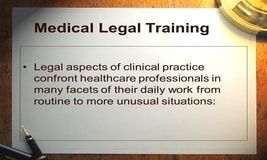Training Course on Legal Aspects of Health Care
Training Course on Legal Aspects of Health Care empower healthcare professionals, administrators, and legal practitioners with comprehensive knowledge of healthcare laws and regulations

Course Overview
Training Course on Legal Aspects of Health Care
Introduction
In the dynamic and highly regulated healthcare industry, understanding the legal aspects is vital for ensuring compliance, safeguarding patient rights, and mitigating risks. Training Course on Legal Aspects of Health Care empower healthcare professionals, administrators, and legal practitioners with comprehensive knowledge of healthcare laws and regulations. It focuses on the intersection of law and healthcare, equipping participants to navigate the complexities of legal frameworks effectively.
The ever-evolving nature of healthcare regulations demands that professionals stay informed about their rights, responsibilities, and obligations. From patient privacy laws to malpractice litigation and compliance with global health standards, this course offers an in-depth exploration of key legal challenges in healthcare. Attendees will learn to align legal requirements with organizational goals while fostering ethical practices and accountability.
Through expert-led sessions, real-world case studies, and hands-on workshops, participants will gain practical insights into addressing legal risks and building robust compliance mechanisms. Whether it's dealing with consent issues, handling disputes, or ensuring patient safety, this training prepares attendees to make informed decisions in legally complex situations.
Course Duration
5 Days
Course Objectives
- Understand the fundamental legal principles governing healthcare.
- Explore laws related to patient rights and confidentiality.
- Analyze healthcare provider responsibilities and liabilities.
- Learn the implications of medical malpractice and legal defenses.
- Address compliance with national and international healthcare regulations.
- Understand contracts, insurance, and risk management in healthcare.
- Navigate employment laws affecting healthcare personnel.
- Develop strategies for resolving disputes in healthcare settings.
- Promote ethical practices within legal frameworks.
- Enhance decision-making by applying legal knowledge to real-world scenarios.
Organizational Benefits
- Improved compliance with healthcare laws and regulations.
- Reduced legal risks and liabilities.
- Enhanced reputation through adherence to ethical and legal standards.
- Strengthened patient trust by safeguarding their rights.
- Minimized costs associated with litigation and penalties.
- Improved organizational policies for legal and ethical operations.
- Enhanced employee understanding of legal obligations.
- Greater resilience in addressing regulatory changes.
- Increased efficiency in dispute resolution.
- Strengthened capacity to manage legal challenges in healthcare operations.
Target Participants
- Healthcare administrators and managers.
- Medical professionals, including doctors, nurses, and allied health staff.
- Legal practitioners specializing in healthcare law.
- Policymakers and government health officials.
- Human resource managers in healthcare organizations.
- Professionals in insurance and risk management in healthcare.
Course Outline
Module 1: Introduction to Healthcare Law
- Overview of legal principles in healthcare.
- Key healthcare regulations and their implications.
- The role of law in patient care and safety.
- Case study: Landmark healthcare law cases.
- Group activity: Identifying legal risks in healthcare organizations.
Module 2: Patient Rights and Confidentiality
- Laws protecting patient rights.
- The importance of informed consent.
- Data protection and confidentiality (e.g., HIPAA compliance).
- Case study: Breaches of patient confidentiality.
- Practical exercise: Drafting a patient rights charter.
Module 3: Medical Malpractice and Liability
- Understanding medical malpractice.
- Common legal claims against healthcare providers.
- Legal defenses in malpractice cases.
- Case study: High-profile malpractice lawsuits.
- Workshop: Analyzing risk mitigation strategies.
Module 4: Healthcare Employment and Workplace Laws
- Employment laws affecting healthcare staff.
- Handling workplace discrimination and harassment cases.
- Legal considerations for healthcare unions and contracts.
- Case study: Resolving disputes in healthcare workplaces.
- Brainstorming session: Creating an employee compliance handbook.
Module 5: Compliance and Regulatory Frameworks
- National healthcare policies and legal requirements.
- International standards in healthcare law (e.g., WHO guidelines).
- Monitoring compliance in healthcare organizations.
- Case study: Legal issues in cross-border healthcare.
- Interactive session: Designing a compliance framework.
Module 6: Ethical and Legal Decision-Making in Healthcare
- Ethics vs. legality in healthcare decisions.
- Handling end-of-life care and euthanasia cases.
- Addressing conflicts of interest in healthcare.
- Case study: Ethical dilemmas in healthcare law.
- Role-play: Resolving complex legal and ethical scenarios.
Training Methodology
The instructor led trainings are delivered using a blended learning approach and comprises of presentations, guided sessions of practical exercise, web-based tutorials and group work. Our facilitators are seasoned industry experts with years of experience, working as professional and trainers in these fields.
Register as a group from 3 participants for a Discount
Send us an email: info@datastatresearch.org or call +254724527104
Certification
Upon successful completion of this training, participants will be issued with a globally- recognized certificate.
Tailor-Made Course
We also offer tailor-made courses based on your needs.
Key Notes
a. The participant must be conversant with English.
b. Upon completion of training the participant will be issued with an Authorized Training Certificate
c. Course duration is flexible and the contents can be modified to fit any number of days.
d. The course fee includes facilitation training materials, 2 coffee breaks, buffet lunch and A Certificate upon successful completion of Training.
e. One-year post-training support Consultation and Coaching provided after the course.
f. Payment should be done at least a week before commence of the training, to DATASTAT CONSULTANCY LTD account, as indicated in the invoice so as to enable us prepare better for you.